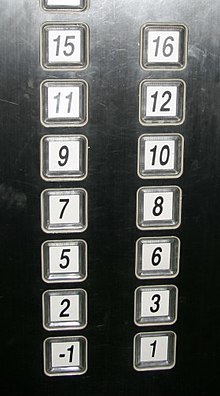Chinese numerology
This article needs additional citations for verification. (November 2007) |
Some numbers are believed by some to be auspicious or lucky (吉利, pinyin: jílì; Cantonese Yale: gātleih) or inauspicious or unlucky (不吉, pinyin: bùjí; Cantonese Yale: bātgāt) based on the Chinese word that the number sounds similar to. The numbers 3, 5, and 8 are generally considered to be lucky, while 4 is considered unlucky. These traditions are not unique to Chinese culture, with other countries with a history of Han characters also having similar beliefs stemming from these concepts.
Zero[]
The number 0 (零, pinyin: líng) is the beginning of all things and is generally considered a good number, because it sounds like 'ling', which means 'good'.
One[]
The number 1 (一, pinyin: yī; Cantonese Yale: yāt) is neither auspicious nor inauspicious. It is a number given to winners to indicate the first place. But it can also symbolize loneliness or being single. For example: November 11 is the Singles' Day in China, as the date has four ‘1’ which stand for singles.
Two[]
The number 2 (二, cardinal, pinyin: èr or 兩, used with units, pinyin: liǎng) is most often considered a good number in Chinese culture. In Cantonese, 2 (二 or 兩, Cantonese Yale: yih or léuhng) is homophonous with the characters for "easy" (易, Cantonese Yale: yih) and "bright" (亮, Cantonese Yale: leuhng), respectively. There is a Chinese saying: "good things come in pairs". It is common to repeat characters in product brand names, such as the character 喜 (pinyin: xǐ; Cantonese Yale: héi; lit. 'joy'), can be repeated to form the character 囍 (pinyin: shuāng xǐ; Cantonese Yale: sēung héi; lit. 'double joy').
- 24 (Cantonese Yale: yih sei) in Cantonese sounds like "easy die" (易死, Cantonese Yale: yih séi).
- 28 (Cantonese Yale: yih baat) in Cantonese sounds like "easy prosper" (易發, Cantonese Yale: yih faat).
Three[]
The number 3 (三, pinyin: sān; Cantonese Yale: sāam) sounds like 生 (pinyin: shēng; Cantonese Yale: sāang), which means "to live" or "life" so it's considered a good number. It's significant since it is one of three important stages in a person’s life (birth, marriage, and death).
On the other hand, number 3 (三,pinyin: sān; Cantonese Yale: sāam) sounds like 散 (pinyin: sàn; Cantonese Yale: saan) which means "to split" or "to separate" or "to part ways" or "to break up with" so it is a bad number too.
Four[]

The number 4 (四, pinyin: sì; Cantonese Yale: sei) is considered an unlucky number in Chinese because it is nearly homophonous to the word "death" (死 pinyin: sǐ; Cantonese Yale: séi). Thus, some buildings in East Asia omit floors and room numbers containing 4, similar to the Western practice of some buildings not having a 13th floor because 13 is considered unlucky. Where East Asian and Western cultures blend, such as in Hong Kong, it is possible in some buildings that the thirteenth floor along with all the floors with 4s to be omitted. Thus a building whose top floor is numbered 100 would in fact have just eighty one floors. Similarly in Vietnamese, the number 4 (四) is called tứ in Sino-Vietnamese, which sounds like tử (死) (death) in Vietnamese.
Five[]
The number 5 (五, pinyin: wǔ; Cantonese Yale: ńg) sounds like "me" in Mandarin (吾, pinyin: wú; lit. 'me') and Cantonese (唔, Cantonese Yale: m̀; lit. 'not').
- 53 (pinyin: wǔ sān; Cantonese Yale: ńg sāam) sounds like "my life" in Mandarin (吾生, wú shēng) and Cantonese (唔生, m̀ sāang).
- 54 (pinyin: wǔ sì; Cantonese Yale: ńg sei) sounds like "my death" in Mandarin (吾死, wú sǐ) and Cantonese (唔死, m̀ séi).
- 58 (pinyin: wǔ bā; Cantonese Yale: ńg baat) sounds like "me prosper" in Mandarin (吾發, pinyin: wǔ fā) and Cantonese (唔發, m̀ faat). nb. in Cantonese this combination may also be seen as an inauspicious number as it can mean no prosperity. (沒發)
Five is also associated with the five elements (Water, Fire, Earth, Wood, and Metal) in Chinese philosophy, and in turn was historically associated with the Emperor of China. For example, the Tiananmen gate, being the main thoroughfare to the Forbidden City, has five arches.
Six[]
The number 6 (六, pinyin: liù) in Mandarin sounds like "slick" or "smooth" (溜, pinyin: liū). In Cantonese, 6 (Cantonese Yale: lok6) sounds like "good fortune" or "happiness" (祿, 樂 Cantonese Yale: lok6). Therefore 6 is considered a good number for business.[1]
Seven[]
The number 7 (七, pinyin: qī) in Mandarin sounds like "even" in Mandarin (齊, pinyin: qí), so it is a good number for relationships. It also sounds like "arise" (起, pinyin: qǐ) and "life essence" (氣, pinyin: qì) in Mandarin. Seven can also be considered an unlucky number since the 7th month (July) is a "ghost month". It also sounds like "to deceive" (欺, pinyin: qī) in Mandarin. In Cantonese, 7 (Cantonese Yale: chāt) sounds like